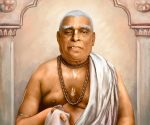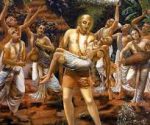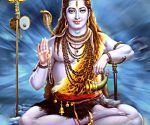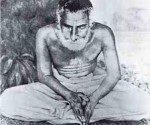Glorification of Lord Rama
April 19, 2013 (VNN) by Sri Srimad Bhaktivedanta Narayana Gosvami Maharaja
[Mathura, India: April 12, 2000]
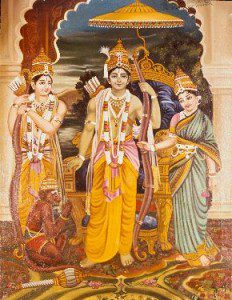 Rama-katha is endless. Sankarsana (Lord Anantadeva) himself continuously sings the glories of Sri Rama, but even with unlimited mouths he is unable to touch the end in any way. We can just relish, and pray that these infinite pastimes may appear in our heart. Tulasi dasa has written Rama-caritra-manasa, which is based on Sri Valmiki’s Ramayana. All the pastimes written by Tulasi dasa come from the Ramayana and other Puranas, but the principles of bhakti that he gave there have been taken from Srimad-Bhagavatam. He presented important selected verses, especially from the eleventh canto, and translated them into Hindi poetry.
Rama-katha is endless. Sankarsana (Lord Anantadeva) himself continuously sings the glories of Sri Rama, but even with unlimited mouths he is unable to touch the end in any way. We can just relish, and pray that these infinite pastimes may appear in our heart. Tulasi dasa has written Rama-caritra-manasa, which is based on Sri Valmiki’s Ramayana. All the pastimes written by Tulasi dasa come from the Ramayana and other Puranas, but the principles of bhakti that he gave there have been taken from Srimad-Bhagavatam. He presented important selected verses, especially from the eleventh canto, and translated them into Hindi poetry.
Some people consider Tulasi dasa to be a mayavadi, but this is not correct. If we study Rama-caritra-manasa carefully, we can see that Tulasi dasa has written down the same principles that are in Srimad-Bhagavatam. God is personal, the living entities are His parts and parcels, and our eternal constitutional position is to serve Him with love and affection. Another important point is that Tulasi dasa could not have written Rama-caritra-manasa unless he truly saw all these pastimes of Rama. Just as Valmiki received the mercy of Narada Muni, similarly, when Tulasi dasa sat down in trance, all the pastimes came into his heart. He has certainly received the mercy of Vyasadeva. Only by Sri Vyasadeva’s mercy could he have written these pastimes.
The main topic of this class is ‘anyavilasita sunyam,’ freedom from desires other than the desire to please Krsna. Bharata and Satrughna had gone to their maternal uncle’s place, and upon returning to Ayodhya, they noticed that all was silent. Usually the city was cheerful and so many activities were joyfully taking place, but now it was like a lady whose husband is dead and who wears no decorations or ornaments. Seeing these and other inauspicious omens, Bharata and Satrughna became fearful. When they entered the royal palace and went to Kaikeyi’s chamber, they were stunned to hear how Rama had gone to the forest for fourteen years and, because of that, their father had died of a broken heart. When Bharata heard this news and the reason for it, he became completely inimical towards his mother. From his heart he disconnected his relationship with her, and because of his pain and shock, he spoke harshly and abandoned her.
Bharata later assembled the citizens of Ayodhya, including Kausalya and Vasistha Rsi, and went to the forest to try to bring Lord Rama back. Because he was now the eldest member of the family, he was responsible for making the decision as to what to do. Maharaja Janaka would be holding a sabha, an assembly meeting, on the next day. To prepare for this, Bharata first went to Mother Kausalya and requested her, “O mother, Rama loves you and always obeys your orders. You miss Him so much, and we all want him back. Please ask him to return and happily rule here in Ayodhya.” When Kausalya heard these words she said gravely, “Yes, you are right. I also want this, but I cannot do what you ask. Your suggestion is not against dharma, but now you should look at Rama’s position. According to religious principles, He is also trying to execute the order of your father. From your respective positions you are both trying to act righteously. I’m sorry, but I know He will never change His decision, so I cannot do anything.”
Disappointed, Bharata now went to his Gurudeva, Vasistha Muni, and made the same request. He said, “If you order Rama, He will come back and you will be the cause of everyone’s happiness.” Vasistha Muni’s answer was similar to that of Kausalya, but he presented an alternative. He said, “Instead of Rama, if you yourself agree to go to the forest, perhaps I can make him return to Ayodhya. Someone must go, so you can do it.” Bharata very enthusiastically agreed, but when Vasistha presented the proposal to Rama, he could not change His decision. Again, Bharata was disappointed.
Bharata thought his only remaining shelter was Sunaina devi, the wife of Maharaja Janaka. He visited her on the evening before the sabha, and very politely pleaded at her feet, “Mother, are you not worrying about your daughter? She is so gentle and tender, and She is going to the forest for fourteen years where she must perform severe austerities. I know your heart is so soft and you cannot bear this pain. You must do something to help them.” Sunaina replied, “What you are saying is what I also want. But my husband is very strict and he will never change his mind nor hear my words. He will consider both sides as per the principles of religion, and then he will give his decision. He is a liberated soul, and nobody can influence him.” Because Janaka Maharaja was a jnani-bhakti, a devotee with some aisvarya, he knew well that there would never be a problem for Rama – anywhere He would be. Bharata was again disappointed, but there was nothing he could do.
The next morning Guru Vasistha convened the assembly. On one side Lord Rama was sitting with Sita devi, on the other side Bharata was sitting with all the citizens of Ayodhya, and Maharaja Janaka was on the asana in the middle, to hear the case and give the decision. The evening before, all had agreed to abide by the order of Maharaja Janaka because he knew religion and was impartial.
He first inquired from Bharata, “What is your proposal? Please speak.” With folded hands, Bharata said, “All I want is that Lord Rama shall come back to the kingdom. His father has given his order, but under unfortunate circumstances. Maharani Kaikeyi also became influenced, and she participated in this decision. This should not be considered as the ultimate decision, because now we can see that there is no real purpose for them to go to the forest. I am not going to accept the position of the king. By all evidence it belongs to Rama. This is what all the citizens want, and I also want it. It will be a great injustice if we send Him to the forest and don’t give Him this position.”
Maharaja Janaka was silent. He then turned to Lord Rama and asked Him to speak. Rama then said, “Yes, you have heard what Bharata said. My father agreed with the order to send Me to the forest and to give the position of king to Bharata. Mother Kaikeyi jointly participated, and my father kept silent. ‘Maunam sammithi laksanam. Silence is the symptom of agreement or consent.’ Now Kaikeyi wants to retract her statement, but that cannot be accepted. Why? Because my father is here no more. If he would be here and just remain silent, then I could agree. But that is not the situation. That is what I have to say.”
Maharaja Janaka closed his eyes and went into silent meditation upon his Gurudeva, Lord Sankara. After coming out of his meditation he very gravely began to speak, “Yes, what Bharata has said is true and is according to religious principles. He is speaking with a pure feeling of love. His prema for Rama is very deep, like an ocean, and Rama’s maryada, His adherence to dharma and strictness in following the principles of religion, is like a mountain. Bharata’s ocean of love is so deep that the mountain will sink into that ocean. Bharata has won, and whatever is his decision shall be done.” When everyone heard that Rama would now come back, they all began jumping in ecstacy, and Bharata was also so happy.
However, Maharaja Janaka had something else to say. All could see that he was still very grave, and they waited to see what would come from his mouth. He then said, “Though the ocean of Bharata’s love is so deep that Rama’s mountain of maryada has sunk into it, at the same time this mountain is so strong that it will not deviate even an inch, even if it is drowned in water. It will stay in its position. Rama may be overcome by the love of Bharata, but He will not move.”
Then he looked to everyone and said, “Now Bharata should consider this point. It is true that his love has won, and there is no comparison to his love, but he should know the principle of love. The current of love does not consider any obstacles on the way. It crosses all the general rules and regulations, and there is no principle of religion which controls it. It has its own law and tradition.
“The heart and theme of love is that one who loves will always be very careful about the desires of his lover. He will not impose his desires upon his lover, but will instead minutely observe what his worshipful deity wants. That is what must be seen and understood. So my question to Bharata is this: Did you try to understand what Rama wants, or did you become overwhelmed with your own desires? Did you think, ‘If I am unsuccessful in bringing Rama back, then all the citizens will criticize me. Perhaps for my own reputation I may be doing this.’ To be only thinking of what is pleasing to Rama is the principle of real love.”
When everyone heard this, especially Bharata, it was as if the earth had slipped from under their feet. For some moments Bharata’s breathing stopped, and it was as though he was deaf and dumb. Maharaja Janaka continued, “Now you must decide what to do. Your case is strong and you have won; you must tell Rama what you want Him to do.”
Bharata had now gotten the biggest shock of his life. His whole nervous system had broken due to this lesson about love, and his heart and thinking were completely changed. When he approached Rama, who understood the mood and gravity of his feelings, Rama said, “Yes, you have won. You want me to rule the kingdom, so I accept your request. I will now act as the King of Ayodhya. Since I am the king, you must now follow my directions. What should you do? You should let me go to the forest and fulfill the orders of our father. On my behalf, while I am in the forest, you should become My representative and do the needful duties for the kingdom.”
Bharata accepted this, and we cannot understand what kind of happiness he was feeling. So many opposite sentiments were coming in his heart and jumping, but he accepted Rama’s order because now he understood the meaning of love. Even if one has to drink poison to please his lover, he should do this. This is the evidence of pure love. Similarly, when Kaikeyi was requested by Rama as a child to later banish him and give the kingdom to Bharata, her heart was broken and she cried out, “No, Rama. I cannot do that.” Why not? She loves Rama more than Bharata. How could she do that? But Rama compelled her; He forced her, saying, “You must drink this poison, mother, because it is for the welfare of the whole world. This is My purpose for coming here, so you must do this.”
Bharata thus took Rama’s crown, His wooden sandals, and His rajai. Rajai is a Hindi word. Most people, those who are not dedicated to the personal form of Lord Rama, think that rajai means only ‘quilt.’ They say, “Just see how Bharata is so cruel. Rama had to go to the forest, and Bharata even took his sandals and his quilt.” But here rajai here does not mean quilt. It comes from the word raji, meaning ‘to agree.’ Bharata took the orders of Rama, to act as His representative and manage the kingdom in His absence.
Here is a very important lesson for all who are practicing bhakti. We hear the sloka beginning “anyavilasita sunyam,” and we can very critically look into our hearts and consider, “What am I doing? Am I trying to serve Krsna in the way my mind likes to serve Him?? It is a subtle difference, because the mind is very tricky. If we fail to distinguish between these feelings, then anyavilasa, material desires, will cover our bhakti and there will be no way we can advance. Today, about ninety-nine percent of the devotees are like this. Some do it willfully, and some fail to distinguish the difference. If Gurudeva asks them to do something which is not pleasing to their own mind, they get angry or annoyed with him. That is prevailing in the majority of cases. We have to very carefully observe this and try to kick out this anyavilasa.
Bhakti is not so cheap. We are trying to attain that love which controls both Srimati Radhika and Krsna, but we must understand what price we have to pay for this. We have to give up everything we consider to belong to us. We do not have any separate existence of our own. The feeling of unconditional, unalloyed surrender is so deep that we become one with the mood of Gurudeva. Then, within our hearts, all aspirations are no longer our aspirations. They are Gurudeva’s aspirations, or those of Hari, Guru, and Vaisnava. This is the state we want to achieve, and unless we attain it, there is no way to advance in bhakti.
Whatever position we want to achieve in eternal Vraja, we have to start practicing here with Gurudeva. We have to apply this verse, anyavilasita-sunyam. Srila Bhaktivinoda Thakura has written: “I have happily mixed all my desires in Your desires. My desires follow Your desires. There is no difference. They do not go even to a small degree in a different direction. They are completely in line with Your desires.” This is what we want.
Maharaja Bharata then returned to Ayodhya with all his citizens, and he brought the sandals of Lord Rama. There was so much pain and grief on his return that he did not enter the kingdom. He acted like a representative and stayed in a village near the city, called Nandigrama. There he made a small hut, like Rama’s hut in the forest, and took the dress of a renunciate, like Rama. He did not cut his hair, and he lived only on fruits or whatever was available in the forest. He placed those wooden sandals on an altar and began worshipping them, just as if he was worshipping Rama. He performed arati, offering food, and made all the decisions based on consultation with those wooden sandals. All his ministers also came there to discuss the ruling of the kingdom.
Mathura, April 13, 2000
Janaka Maharaja gave the definition of bhakti to Lord Rama’s brother, Bharata. “Anyabhilasita-sunyam, jnana-karmady-anavrtam, anukulyena krsnanu-silanam bhaktir uttama. One who has no desire other than to please Krsna, and who is not influenced by the process of jnana-marga (cultivation of the knowledge leading to an impersonal understanding of the Absolute Truth) karma, and so on, is situated in pure bhakti.” The king told him that nothing can control prema (pure love of God); it has its own law. One who has prema will always consider the desires of his object of love. He has no personal interest. He will always think, “How will my beloved be pleased?” Our real purpose is to please our worshipful deity, God and Guru; not to please ourselves.
Much later, after Ravana was killed, Sita-devi had to undergo the agni-pariksa, fire test. Of course, it was Maya-Sita who entered the fire and the real Sita-devi remained unharmed – proving that she was completely pure and chaste. Rama then gave the kingdom of Ravana to Vibhisana, Ravana’s brother, and after that He took Sita-devi and all their associates to Ayodhya on a mystic airplane. There were millions and billions of associates, but this airplane was able to expand so that they could all fit on it.
On their journey, Rama pointed out to Sita all the places where they had enjoyed pastimes together, and where He and Laksmana had killed various demons. For example, Rama would say, “Oh look, here is where we built the bridge to Lanka. Do you remember?” When they reached Kishkinda, where all of Rama’s monkey associates lived, they stopped. Sita-devi then invited all the wives of the monkeys to come aboard the airplane, as they were also very interested to see Rama’s coronation.
The party stayed one night and then went to Chitrakuta. Hanuman took the form of a brahmana and went to the place where Bharata was staying in Nandigrama. Bharata was living the life of a renunciate there, wearing simple cloth, with matted hair and living on fruits and roots; and all of His ministers lived in the same way. In the guise of a brahmana, Hanuman approached Bharata and said, “Oh Bharata Maharaja, Rama has come. Prepare to welcome Him!” Upon hearing that His dear brother had finally returned, He was overjoyed and fainted. When He came to consciousness He said, “I want to give you many gifts. So please accept 18,000 cows, as many beautiful women as you desire, horses, and other wealth. Still I cannot give you anything equal in value to the news you have given Me.” Hanuman then returned to his original form, and Bharata said, “Oh, you are Hanuman!”
After Rama’s abhiseka ceremony, He wanted to give many gifts to everyone. Sita-devi thought of a very nice gift to give Hanuman, so she gave him her most beautiful pearl necklace. Hanuman took it, examined it and broke it, and the pearls scattered all over the floor. Sita-devi was surprised and asked, “What are you doing?” Hanuman replied, “Oh, I was just seeing if ‘Rama’ is written anywhere here.” “But don’t you know Rama is in your heart?” she asked. Then Hanuman tore open his chest. In this way, Rama’s associates teach us that whatever is given to others should be in connection with Krsna.
Lord Rama and Sita-devi stayed together for many years, and everyone was very happy within their kingdom. Some people, however, criticized Rama for accepting Sita back after she had been in the palace of Ravana. According to Vedic principles, it is unacceptable to accept one’s wife after her being away for one night – what to speak of one year. One evening, the wife of a washer-man came home late. Her husband immediately told her that she could not enter the house. He threw her out saying, “I am not like Rama, who accepted his wife back after she’d been with another man.”
This news spread and the story got back to Rama. He was most disturbed, and realized that He had to do something. How could He rule a kingdom in which some of the people did not have faith in Him? He called a meeting, asking all His brothers to come; but none of them could give Him any advice. He Himself then realized what to do. He remembered that Sita had desired to visit all the sages in the forest and shower them with gifts. He asked Laksmana to take her to the asrama of those sages, deliver His sorrowful message to her, and then leave her in the forest. Laksmana was devastated that He was called upon to do this, but He could not say anything, as He was Rama’s younger brother. He therefore had to accept that responsibility.
Sumanta was Laksmana’s chariot driver, and moreover a very great minister of Rama. Laksmana told everything about Rama’s order to Sumanta and said, “My life is full of miseries. Now, today is the biggest misery of My life!” They passed Prayag and went across a river. “Valmiki’s asrama is here,” Laksmana told Sita. Then with a heavy heart, He told her, “Everyone is accusing Rama of accepting an unchaste wife. Many people don’t have full faith in Him now; so how is it possible for Him to rule the kingdom and guide the citizens properly?”
When Sita-devi heard this she fainted, and when she revived she said, “I don’t want to create any difficulties for Him. I do not want Him to be disturbed by the public. Please pay my obeisances to all. Laksmana, I want to pray at Your lotus feet, as I have offended You twice. The first night in Ayodhya, after our marriage ceremony, I stopped You from massaging Rama’s lotus feet. Though this had been Your cherished duty for many years, I took this away from You. When You asked Rama about this, He could not answer. Then we asked the great sage Vasistha and he said, ‘The duties now have to be divided. So Laksmana, all the duties outside of the house should be taken by You. Sita-devi should now perform all the duties inside of the house.’ In this way it was decided.
“Secondly, I was once allured by a deer in the forest when we were in exile. I heard Marici call out, ‘Alas, Laksmana!’ Assuming it was Rama’s voice, I told You to go immediately to help Him. You said, ‘No Sita, it is an illusion created by a demon.’ I insisted and told you, ‘I know. You are a spy of Bharata, and You have lusty feelings for me. That is why You don’t want to save your brother!’ These words pierced Your heart. You replied that You always saw me as Your mother and had never even seen my face; You said that you had only seen my feet. You could not bear these harsh words. Then, when you went to see Rama, He chastised You saying, ‘Why did You take heed of the words of that woman?’ Then Ravana came here and begged, ‘biksana dehi’ three times. When I did not want to come outside of Your circle of protection He threatened me, ‘I curse you that your husband will die if you do not give anything to me here!’ So please forgive me for these offenses.”
After leaving Sita-devi in the forest, Laksmana lamented, “Oh, alas! I will surely give up My life!” Sumanta tried to pacify Him, and told Him the truth of the matter. “Once I was with Dasaratha Maharaja, and at that time two sages, Vasistha Rsi and Durvasa Muni, came to visit him. Maharaja Dasaratha served them very nicely and then asked them to kindly tell him about the future of his four children. Vasistha Rsi remained silent, and Durvasa Muni responded by saying, ‘Oh, you have four sons. Very good.’” Dasaratha Maharaja said, “Yes, first tell me about Rama’s future.” Durvasa said, “Rama’s future will undoubtedly be full of miseries. He will have to leave Ayodhya, and everyone there will feel unbearable separation from Him. You will not be able to bear His absence, and you will die in separation. Rama will later have to be separated from His wife, and after suffering immensely they will become reunited. Then again they will have to be apart; and Rama will rule the kingdom alone without His wife. Do not tell this to anyone.” Dasaratha Maharaja was in complete shock, but he promised that he would not speak to anyone what he had heard. He said, “From today, I am your disciple.”
Having heard this from Sumanta, Laksmana realized that His brother Rama is in fact the Supreme Lord Visnu. Sumanta continued telling Laksmana the story that Durvasa Muni had told to Dasaratha Maharaja: “Once, a very big battle ensued between the demigods and the demons. The demons were defeated and went to the wife of Brghu Maharaja to take shelter; and, being very merciful, she gave them shelter. The demigods went to Lord Vamanadeva and told Him the situation. He then took His cakra and beheaded Brghu Maharaja’s wife. Brghu Maharaja was very upset and cursed Vamanadeva saying, “You are responsible for my wife’s death. I loved her very much. Now I will have to suffer so much in separation from her. For this I curse You that You will have to suffer in the same way in the future. You will have a very beautiful wife who will serve You in every way. You will be fully satisfied and completely enamored with her feminine grace and charm, and her saintly qualities. You will then be separated from her, and You will always suffer immensely from that pain of separation.” Hearing this, Vamanadeva happily accepted the curse. He knew that in the future the whole world would be benefited by this. Also, this was but a pretext, as separation naturally increases the happiness of meeting.
Sita-devi was walking towards the asrama of Valmiki Rsi, when some of his brahmacaris spotted her. They informed Valmiki that a lady looking like a demigoddess was coming. Valmiki came out to greet her, and immediately recognized who she was. He said, “Oh, you are Sita-devi, the wife of Lord Rama. I know this because I have written the Ramayana. Please come in.” The ladies there were very pleased to see Sita-devi and said, “Oh, please allow us to serve you.” Valmiki instructed them how to serve her in every way.
When Rama sent Satrughna to Mathura, Satrughna happened to come by Valmiki’s asrama on the way. He paid obeisances to Sita-devi and her sons, Lava and Kusa, from a distance. Lava and Kusa were very intelligent children. Valmiki was very expert in archery, singing, and music, and he taught Lava and Kusa these arts. They could thus sing in all ragas very sweetly. Valmiki also taught them the Ramayana.
No one in the entire kingdom was there to console Rama. However, the ladies were there to console Sita-devi in the asrama of Valmiki. One day Rama turned to Vasistha Rsi and said, “Will you please perform a sacrifice?” Vasistha replied, “Then you must call your wife back.” “Oh, I cannot do that.” “Then you must remarry,” he insisted. Rama said, “It is not possible.” “Then you will have to make a golden deity of Sita-devi.” Vasistha then performed the sacrifice. In fact, every year he performed a very big sacrificial ceremony for Rama, near Naimisaranya on the bank of Gomati, with a new golden deity of Sita-devi each year.
One year many kings and sages were called, and Valmiki came with Lava and Kusa. The boys were extremely beautiful, with very broad chests and slender waists. During a rest period, Valmiki asked them to sing Ramayana. They had melodious voices, and they sang in such a heart-rendering way that they captured everyone’s hearts. Rama was especially touched, and tears came to His eyes. Valmiki had previously warned the boys, “If anyone asks you who you are, tell them, ‘I am a disciple of Valmiki.’” Rama ordered Laksmana, “Go and give them eighteen thousand gold coins and many, many beautiful clothes and gifts. Then ask them who they are.”
When they were presented with these gold coins, clothes, and gifts, they said, “What will we do with all these things? We are brahmacaris.” Then Laksmana asked which dynasty they belonged to, and they replied, “You seem very learned. Why ask this? Why not ask who is our Gurudeva? We are disciples of Valmiki Rsi.” For five or seven days they came and recited the Ramayana, and after many days Rama and others came to know who they were.
Rama then called Valmiki and requested that Sita-devi come and prove her chastity so that He could call her back. Valmiki said, “I have never spoken a lie in my life. I can assure you that Sita is completely pure and chaste.” Rama said, “I know that. I’m quite confident of this, but I want proof for My citizens. So please bring her here. Then we’ll see what we can do.”
At this time Brahma, Sankara, and many demigods and goddesses came, curious to see this event. Sita-devi sent Lava and Kusa ahead to their father. She arrived thereafter, and Valmiki spoke gently to her, “O daughter, Sita-devi. Come forward and prove your chastity.” Sita-devi called out to Mother Earth, Prthivi-divi, “Mother, please prove this to one and all, that I have never served any other man. I have never even had thoughts of any man other than Rama in my whole life. Please accept me, mother.” Prthivi-devi appeared from the earth and Sita sat on her lap on a golden throne. In a moment, Prthivi-devi completely covered her. In other words, she took Sita-devi back with her into the depths of the Earth.
Rama couldn’t bear to see Sita leave Him like this, and He fainted. Then, when He returned to consciousness, He prayed to Prthivi-devi, requesting her to bring back Sita. He told her, “One time I went with a bow to the ocean and he was very much afraid. So I can turn you into dust in a moment.” Just then Brahma came and told Rama, “No. Don’t do it! This is the last time. Sitaji has gone to Your own abode, so You should very quickly wind up Your pastimes and go there.”
Gaura premanande!
[For more information about Rama, Laksmana, Bharata, and Satrughna, see Srimad-Bhagavatam 9.10].




